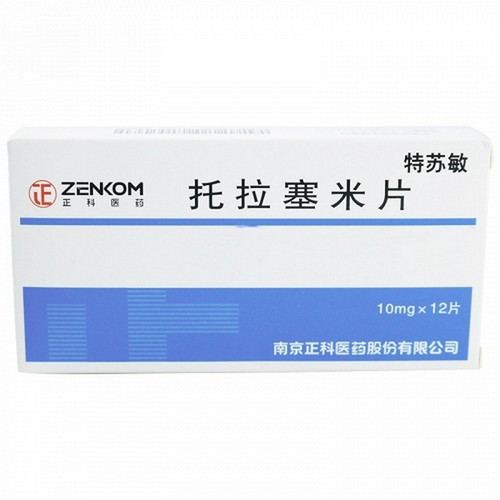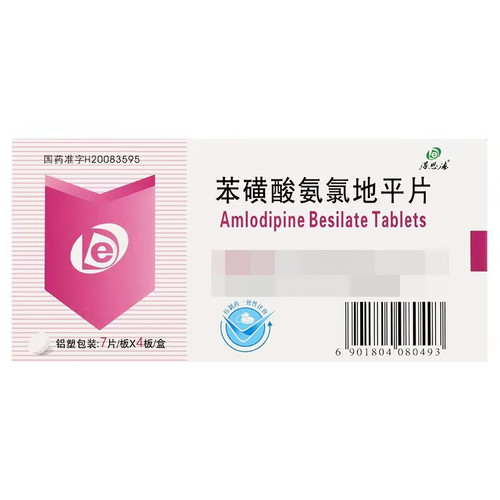Product Overview
[Drug Name]
Generic Name: Torasemide Tablets
Trade Name: Tesumin
English Name: Torasemide Tablets
Chinese Pinyin: Torasemide Tablets
[Ingredients]
The main ingredient of this product is torsemide, chemically known as 1-isopropyl-3-[(4-m-toluamino-3-pyridyl)sulfonyl]urea.
[Properties]
This product is a white or off-white tablet.
[Indications]
For patients with congestive heart failure, ascites due to liver cirrhosis, and edema caused by kidney disease; it can also be used for patients with essential hypertension.
[Dosage and Administration]
For edema caused by congestive heart failure, renal failure, and kidney disease: The initial dose is generally 10 mg, taken orally once daily in the morning. The dose can be adjusted based on the patient's condition, generally not exceeding 200 mg per day. For ascites due to liver cirrhosis: The initial dose is generally 10 mg, taken orally once daily in the morning, taken concurrently with an aldosterone antagonist or potassium-sparing diuretic. Essential hypertension: The general initial dose is 5 mg, taken orally once daily. If adequate antihypertensive effect is not achieved within 4 weeks, the dose can be increased to 10 mg, taken orally once daily. If the antihypertensive effect is still insufficient, other antihypertensive medications should be added.
[Adverse Reactions]
Common adverse reactions include headache, dizziness, fatigue, loss of appetite, muscle cramps, nausea and vomiting, hyperglycemia, hyperuricemia, constipation, and diarrhea. Long-term and high-dose use may cause fluid and electrolyte imbalances. Polyuria is common in the early stages of treatment and in older patients. Some patients may experience hypotension due to hemoconcentration, mental disturbances, thrombotic complications, and cardiac or cerebral ischemia leading to arrhythmias, angina pectoris, acute myocardial infarction, or syncope. Hypokalemia may occur in patients with a low-potassium diet, vomiting, diarrhea, excessive use of laxatives, and abnormal liver function. Some patients may experience skin allergies, occasionally itching, rash, and photosensitivity reactions. Rarely, dry mouth, paresthesias in the limbs, and visual impairment may occur.
Contraindications:
1. Contraindicated in patients with anuria and renal failure;
2. Contraindicated in patients with pre-hepatic coma or hepatic coma;
3. Contraindicated in patients with allergies to this drug or sulfonylureas;
4. Contraindicated in patients with hypotension, hypovolemia, hypokalemia, or hyponatremia;
5. Contraindicated in patients with severe dysuria (e.g., benign prostatic hyperplasia).
Precautions:
1. During long-term treatment with torasemide, regular blood sampling should be performed to monitor electrolytes (especially potassium) as well as glucose, uric acid, creatinine, lipids, and blood components.
2. Urinary dysfunction must be corrected before initiating torasemide treatment.
3. Careful monitoring for electrolytes, hypovolemia, and signs of hemoconcentration should be performed, especially at the start of treatment and in elderly patients.
4. For patients with cirrhosis and ascites, it is recommended that any diuretic be initiated in the hospital. Overly rapid diuresis in such patients can precipitate severe electrolyte imbalances and hepatic coma. Concomitant use of an aldosterone antagonist or potassium-sparing medication is recommended to prevent hypokalemia and metabolic alkalosis.
[Use in Special Populations]
Precautions for Use in Children:
The safety and effectiveness of this drug in children is unknown.
Precautions for Pregnancy and Lactation:
This drug is not recommended for use by pregnant or lactating women.
Precautions for Elderly Patients:
The efficacy and safety of this drug in elderly patients are no different from those in adults, but elderly patients should be particularly careful to monitor their blood pressure, electrolyte levels, and dysuria during the initial use of this drug.
[Drug Interactions]
1. Hypokalemia caused by this drug may exacerbate the adverse effects of cardiac glycosides.
2. This drug may enhance the potassium-wasting effects of salt, glucocorticoids, and laxatives.
3. Nonsteroidal anti-inflammatory drugs (e.g., indomethacin) and probenecid may reduce the diuretic and antihypertensive effects of this drug.
4. This drug may enhance the effects of antihypertensive drugs.
5. Continuous use of this drug or initiation of concomitant use with an angiotensin-converting enzyme inhibitor may result in an excessive decrease in blood pressure.
6. This drug may reduce the effect of antidiabetic drugs.
7. This product, when used in high doses, may exacerbate the ototoxicity and nephrotoxicity of aminoglycoside antibiotics (e.g., kanamycin, gentamicin, tobramycin), cisplatin preparations, and cephalosporins.
8. This product may enhance the effects of curare-like muscle relaxants and theophylline-like drugs.
9. This product may reduce the effects of norepinephrine and epinephrine.
10. This product may increase the toxicity of salicylates when used in patients taking high doses of salicylates.
[Pharmacological Action]
This product is a sulfonylurea pyridine diuretic that acts on the thick ascending limb of the loop of Henle, inhibiting the Na+/K+/2Cl- carrier system and increasing urinary excretion of Na+, K+, Cl-, and water. However, it has no significant effect on glomerular filtration rate, renal plasma flow, or acid-base balance.
[Storage]
Store in a sealed container away from light.
[Strength]
5mg
[Packaging]
5mg x 28 tablets
[Expiration Date]
24 months
[Approval Number]
National Medicine Standard H20052495
[Manufacturer Company Name]
Nanjing Zhengke Pharmaceutical Co., Ltd.








